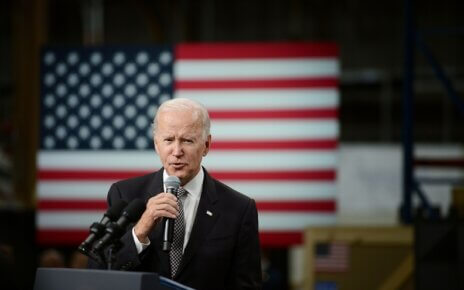Concerns over a potential Russian invasion of Ukraine have continued to grow this past week, with six Russian naval vessels entering the Black Sea amidst the highest state of combat readiness for Russian ground forces in the region, bolstering Russia’s force posture to the highest levels seen since 2014.
In a bid to defuse the crisis, French President Emmanual Macron has been on the move lately, lodging diplomatic trips to both Russia and Ukraine. In Russia, Macron and Russian President Vladimir Putin held a meeting. According to the AP, Macron can be stated as saying that he received reassurances from Putin that there will be no escalation over the crisis in Ukraine. The AP also goes on to cite the Kremlin, which denies that Putin and Macron reached a consensus on no further escalation, with Kremlin spokesperson Dmitry Peskov stating, “in the current situation, Moscow and Paris can’t be reaching any deals.”
Ukrainian President Zelensky stated that concrete steps in diplomacy were welcome from Putin to facilitate de-escalation, according to AP. However, Vladimir Putin in the past has shot down discussions with the Ukrainian President, insisting he speak with Donbas rebel leaders first.
One topic of discussion among Western leaders is how to react should Russia choose to invade Ukraine. A seemingly unified answer comes in the form of an economic response, with a variety of Western states proposing different economic measures to deter and punish Russia should war break out. Nord Stream 2, a contentious natural gas pipeline that would run from Russia to Germany upon completion, has become the latest asset targeted by this hypothetical sanctions regime.
According to RollCall, Senate Minority Leader Mitch McConnell said that in a dinner with German Chancellor Olaf Scholz, the Chancellor said the project would be terminated by the German government in the event of war. This news comes with the diplomatic scramble by the West to find Europe an alternative source of oil and natural gas should Russia cut off supply as retaliation for sanctions.
According to the Washington Post, the United States has discussed the matter with major players in the gas and oil market, and how willing they would be to increase production to offset potential European loss from Russia. It should be noted that during these negotiations, Qatar, an oil rich state in the Persian Gulf, was designated as a major non-NATO ally, a designation possibly indicative of a deal reached by the West and Qatar concerning this matter.
Looking away from Nord Stream, and at other sources of possible punishment, Chuck Schumer has stated that US lawmakers, currently in the process of working out a Russia sanctions bill, are coming close to an agreement, according to Reuters. While not too many details have been revealed about the nature of the bill, Senate Majority Leader Schumer believes it will provide a sufficient deterrent to Russia invading Ukraine, and has also said that the areas of disagreement are being bridged.
Also according to Reuters, Senate Minority Leader McConnell is skeptical about the impact the legislation will play and if it will genuinely deter Russia from invading, saying that its deterrence value comes mainly from when President Biden would sign such a bill into law, which he believes is better off done preemptively than as a reaction.


